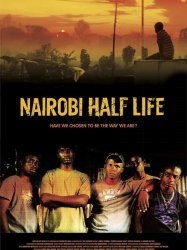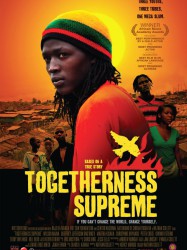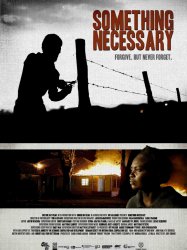Films from the country "kenya", sorted by revenue

Rise and Fall of Idi Amin (1981)
, 1h41Origin Kenya
Genres Drama, War, Thriller, Biography, Historical, Crime
Themes Films set in Africa, Political films
Actors Geoffrey Keen, André Maranne, Jonathan Ross

Rafiki (2018)
, 1h23Directed by Wanuri Kahiu
Origin Kenya
Genres Drama, Romance
Themes Films about sexuality, LGBT-related film, Lesbian-related films
Deux jeunes femmes se rencontrent, deviennent amies et tombent amoureuses l’une de l’autre. Elles sont confrontées aux préjugés de leurs parents et de leurs voisins homophobes, à Nairobi. Elles sont forcées de choisir entre le bonheur et la sécurité, et doivent devenir de gentilles épouses.

Stories of Our Lives (2014)
, 1h2Origin Kenya
Genres Drama
Deux adolescentes sortent ensemble en secret. L'une d'elles trompe l'autre avec un garçon de hasard, et l'autre la quitte.

Fundi-Mentals (2015)
, 1h27Origin Kenya
Actors Lizz Njagah, Gerald Langiri
The storyline of Fundi-mentals revolves around the lives of two Fundis (handymen), Joseph (Gerald Langiri) and his assistant Moses (Charlie Karumi) who like to think of themselves as the best Fundis in Kinoo estate despite their unorthodox methods of fixing things. But the entry of a new Multinational Service Company in town throws all this in jeopardy. To avoid going out of business, they introduce to their female customers a new type of Ex-press service with hilarious consequences.

House of Lungula (2013)
Origin Kenya
Genres Comedy-drama, Romance
Actors Lizz Njagah, Gerald Langiri, Sarah Hassan
Harrison (Gerald Langiri), who urgently requires money to pay for the dowry of his fiancée, Charity (Nice Githinji). Through his boss, Mr. Taylor (Ian Mbugua), he gains access to a huge house, belonging to the CEO of their company Mr. Lungula, which he is charged with cleaning for an agreed fee. A posh empty house presents opportunity and under the right circumstances could generate some quick cash. Alex (Lenana Kariba), Harrison’s friend and co-worker is looking for a place to entertain a ‘client’ for a day. For the right fee, he gains access to the House of Lungula but with conditions of course. Mr. and Mrs. Taylor’s (Lizz Njagah) marriage sails in rocky waters and she has suspicions that her husband is cheating.Sahara (Helena Waithera) provides a solution, an eye for an eye. To be fair, these suspicions are not entirely unfounded as Mr. Taylor is a very naughty man, slinging around the beautiful Chichi (Sarah Hassan) while he’s supposed to be at the office. Chichi on the other hand also has a lover, Tito (Gitau Ngogoyo) to make the plot even more complex.

Gun to Tape (2011)
Origin Kenya
Themes Sports films, Athletics films, Documentary films about sports, Films about the Olympic Games

The Captain of Nakara (2012)
, 1h27Origin Kenya
Genres Comedy, Romance
Au Kwetu, un pays africain dans les années soixante-dix, Muntu, un petit criminel s'éprend Muna, fille d'un évêque évangéliste. Il prétend posséder des emplacements lucratifs sur le marché local mais ne peut concrétiser son mensonge en raison de la corruption omniprésente dans le pays. Pour s'assurer le respect et défendre son honneur il vole un uniforme militaire et se fait appeler capitaine Nakara.

Stories of Our Lives (2014)
, 1h2Origin Kenya
Genres Drama
Themes Films about sexuality, LGBT-related films, LGBT-related films, LGBT-related film
Ask Me Nicely Kate - a rebellious young high school student - encounters Faith, a fellow student in the school corridors. They begin a secret relationship, until the school principal takes action to separate the two by suspending Kate from the school. While away from the school, Kate impulsively has a sexual encounter with a boy in her neighborhood. Upon her return, Kate tells Faith about the encounter with the boy. This annoys Faith, leading to an end of their relationship.

Shiku Song (2004)
, 3minutesOrigin Kenya
Genres Animation
Shiku ne peut pas jouer de la flûte comme il le voudrait, persécuté par son oncle, mais un papillon vole à son secours.

Nairobi Half Life (2012)
, 1h36Origin Kenya
Genres Drama
Themes Films set in Africa
A young man, Mwas (Joseph Wairimu) still lives with his parents in their rural home in Kenya. He makes a living by selling western action films, he dramatically acts and portrays most of the action figures in his films in order to entice his customers. He is an aspiring actor, and when he comes across a group of actors from Nairobi performing in his town, he asks one of them to help him jump start his acting career. But, in return, he is asked to give ksh1000 (approximately US$10) in order for him to be cast in one of the plays. He can only afford ksh500 and is told to take the other 500 with him to the National theatre in Nairobi. He is very excited, and, after receiving some money from his mother, he embarks on his journey to Nairobi with a brief stop over in his town to bade his friends goodbye. He meets his cousin (a gang leader) who gives Mwas an expensive radio system and some money to take to Khanji electronic shop in downtown Nairobi.

Togetherness Supreme (2010)
Directed by Nathan Collett
Origin Kenya
Themes Films set in Africa
Based on actual events, Togetherness Supreme is the story of Kamau, an artist, searching for change in the midst of tribal tension in the slums. Kamau stands up against his father and his tribe to join the other side with his friend Otieno. Kamau and Otieno fight for political change for those living in dire poverty, but they are caught up in the middle of the ethnic conflict that tears apart their country and, furthermore, they are rivals for the love of Alice, a preacher’s daughter. After a contested presidential election (Kenyan presidential election of December 2007), the slums erupt in violence and Kamau's world collapses around him.

Soul Boy (2010)
, 1h1Directed by Tom Tykwer
Origin Kenya
Genres Drama
Themes Films set in Africa
Nairobi, Kenya. 14-year-old Abila lives with his parents in Kibera, one of the largest slums in East Africa. One morning the teenager discovers his father ill and delirious. Someone has stolen his soul, mumbles the father. Abila is shocked and confused but wants to help his father and goes in search of the right remedy. Supported by his girlfriend Shiku, he embarks on an adventurous journey that leads him right to the heart of the microcosm that is his hometown.

The Dreams of Elibidi (2010)
Directed by Nick Reding
Origin Kenya
Genres Drama
Themes Films set in Africa
Ndoto Za Elibidi was devised originally as a stage play for actors from the Nairobi slums. The story pivots around the theme of acceptance and love as its colorful protagonists - parents, four daughters and their lovers - come to terms with HIV and ghetto life. Cutting back and forth from fiction to documentary, from the original stage play to the actual locations, it takes us on two parallel journeys: we watch the story, but we are also watching it through the eyes of the ghetto audience.

Pumzi (2009)
Directed by Wanuri Kahiu
Origin Kenya
Genres Drama, Science fiction
Themes Political films, Dystopian films
Set in a post-apocalyptic world in which water scarcity has extinguished life above ground, the short follows one scientist's quest to investigate the possibility of germinating seeds beyond the confines of her repressive subterranean Nairobi culture.
 Connection
Connection
